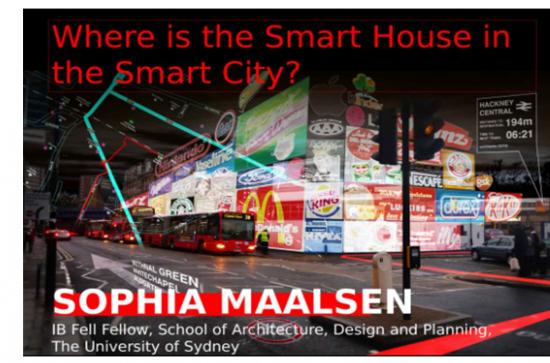
In this seminar Dr. Sophia Maalsen will be presenting her preliminary explorations into situating the smart house in the smart city research as one part of her broader project, ‘Housing Futures: Smart and Shared’ – a project which looks at how smart technologies and the housing affordability crisis are reconfiguring housing. This project responds to both these imperatives – understanding the experiences of share housing as an increasingly important form of living, and understanding the smart home beyond owner occupation. It asks: how are shared and smart houses being made in contemporary Australia and what are their implications for housing policy? Increasing attention is directed to smart cities as their popularity as a ‘fix all’ for the economic, environmental and social challenges facing cities, continues to grow. Contemporaneously, there is a growing amount of literature on the smart home and smart housing, likewise positioned as a smart solution to environmental, economic and social problems. Despite the increased activity in these two ‘smart’ areas, there is little research that addresses smart housing in context of the smart city. Furthermore, in the limited research on smart housing, a comparatively small amount of literature addresses their ‘smart’ nature from a social science perspective. Of the scant literature that addresses both the smart house, even less does so from a social science lens of analysis, with publications predominantly located in the computer sciences and engineering. This is problematic on multiple levels. First, the dominance of computer science and engineering literature on both smart cities and smart houses, privileges technological solutions to city and housing issues and contends that improvement will be an automatic outcome of technology, rather than understanding how people can use the technology for better outcomes. Secondly, the relative absence of housing in smart city discourse makes invisible a key component of the city and its broader web of relations, flows of people, capital, materials and resources. In this seminar, she discusses these gaps in the literature, identifies why this is problematic and suggests areas where the smart city and smart housing intersect. This research is funded by the generosity of the Ian Buchanan Fell Trust and Sophia would like to acknowledge their support.
For further information please visit our website The Programmable City
